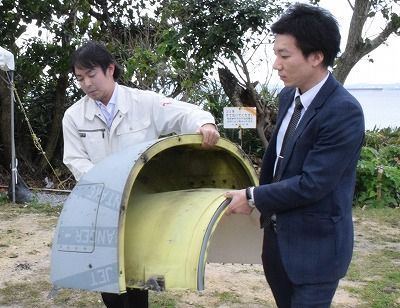Minister of Defense says internal communication delays by U.S. military caused late reporting on dropped Osprey engine intake, no apology from U.S. military

Okinawa Defense Bureau employees carrying the fallen Osprey engine intake part, which landed on Odomari Beach on Ikei Island, Uruma. February 9, around 3:00 p.m.
February 16, 2018 Ryukyu Shimpo
Tokyo – Japanese Minister of Defense Itsunori Onodera spoke at a press conference concerning the accident wherein an engine intake falling from an MV-22 Osprey February 16.
Regarding the issue of the late notification from the U.S., he commented that, “The III Marine Expeditionary Force (III MEF) was not quick in notifying U.S. Forces Japan central command,” indicating that the cause of the late notification was due to late internal communication by the U.S. military.
It appears there was also no apology.
Notification of accidents is outlined in detail in the U.S. Japan Status of Forces Agreement (SOFA).
The failure to properly communicate within even the U.S. military would appear to be in violation of the agreement.
According to Onodera, the III MEF, which is transported by the Osprey, “fully understand that when an incident such as this on occurs, it is necessary to notify U.S. central command.”
He also explained, “Furthermore, the U.S. military will continue to improve on their methods for notifying and sharing information with the Japanese government.”
The Minister of Defense requested that he be notified immediately.
Regarding the late notification, Onodera concluded, “The fact that they said they would continue to improve on their end shows they acknowledge that up until now it has been insufficient.”
(English translation by T&CT and Sam Grieb)
Previous Article:Former Defense Minister Kyuma doubts need for Henoko base due to military technological advancements
Next Article:Okinawa Prefectural Board of Education requests the suspension of flight above schools
[Similar Articles]
- Government asks Saga to tentatively host U.S. MV-22 Osprey
- U.S. military to deploy more Osprey to Okinawa
- Okinawa Governor says moving Futenma Air Station to Henoko is impossible
- After 2-plus-2 Conference, How long will Japan continue to be subservient?
- Defense Minister estimates total cost of Henoko relocation at more than 350 billion yen
 Webcam(Kokusai Street)
Webcam(Kokusai Street)


